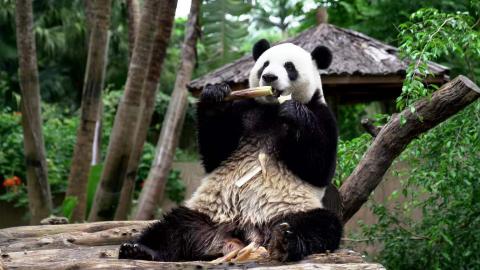Local Spring Festival Customs in Haikou
China is a vast country, home to numerous ethnic groups and fascinating, diverse customs. Over time, places have formed their own unique annual customs. Including their own take on the annual Spring Festival.

- “Caiwu”
In Haikou, the capital city of Hainan Province, people always hoping for a sunny day before New Year's Eve. It’s so each family can give their house a thorough clean, as part of a tradition known locally as ‘Caiwu.’
The house is generally cleaned with dried green bamboo leaves which are gathered to make a broom to clean up the dust, cobwebs and other dirt accumulated on the roof, eaves and walls.
At the same time, the furniture is also dusted, while clothes and quilts are washed that very same day. The ritual is intended to sweep away all the ‘bad luck’ out of the door and welcome the arrival of the new year.
- Shopping for New Year
All over China, people prepare in advance for the arrival of the New Year. Besides creating all sorts of decorations such as lanterns, Spring Festival couplets, blessing characters and so on, residents of the coastal city of Haikou like to focus on dried seafood. Redfish, cuttlefish shreds, squid shreds, sea fish, dried shrimps, seahorses, seashells among others are popular these days.
Potted plants and flowers are also a must for the New Year. The kumquat tree, for example, symbolises wealth, while various orchids carry a special meaning which makes them indispensable in every household. Besides bringing good energy, they also decorate the houses.
- Paste the Spring Festival couplets and ‘Lishi’couplets
In Haikou, besides the Spring Festival couplets, locals also like to paste the so-called ‘Lishi couplets, made of red paper and with the word "Fu" written on it, meaning happiness and good fortune.
The number of banners should be odd, usually three, five, or seven. Some locals also hang a string of oranges tied with red strings at the front of the door alongside.
- Ancestor worship and New Year's Eve dinner
Ancestors worshipping is a very important tradition in Haikou's New Year's Eve celebrations. Locals prepare very rich dishes with chicken, duck, fish, various meat and vegetables, for example, to worship ancestors. Generally, local Hainanese boiled chicken and brown sugar rice cakes are prepared as well.
Every family places steamed sponge cake, boiled chicken, sweet potato wine or rice wine in front of the memorial tablet of ancestors. Then, the elders lead children and grandchildren to worship their ancestors. They first burn paper money, present candles and sacrificial offerings and then salute the ancestors. Once the ritual is over, they set off firecrackers and the whole family begins to eat the New Year's Eve dinner around the table. In Hainan, this family reunion dinner is also known as ‘Weilu.’
- Eating Vegetarian pot
On the first day of the Lunar New Year in Haikou, people will eating Vegetarian pot.Eggplant ,Hainanese means better year by year,“Water Celery ,the Chinese pronunciation was similar with diligent, means the whole family will be diligent in the new year.
And long rice noodles symbolise a long life. The yellow fried tofu in the shape of gold ingots, on the other hand, means attracting wealth. All vegetables included in the dish are meant to bring good luck. Families always gather to eat at 00:00 on the first day of Lunar New Year or in the morning when the family all gets up.
On the first morning of the New Year, Haikou locals kick off the day with a ‘vegetarian meal” immediately after waking up. This is intended to bring peace and cleanliness to the body, while serving as a reminder of family ancestors.
Eating different vegetables also stands for different New Year wishes. If a family prepares the plain-frying eggplant, for example, it means it hopes to be ‘better and better, year after year,’ according to the Hainanese dialect. If, on the other hand, the plain-frying celery is cooked, this means the whole family wishes to work hard and generate income in the new year. There are plenty of options of vegetarian dishes with different meanings to be chosen by every family according to its wishes.
- Taboo on the first day of the Lunar New Year
On the first day of the Lunar New Year, carrying water outside is forbidden. For that reason, people need to fill the water tank the day before.
As sweeping the floor means throwing away good fortune, this is also forbidden once entering into the New Year. Also, people can't get into any conflict with each other and should express nice words when meeting other people such as ‘Guo Nian Hao’ or ‘Gong Xi Fa Cai.’
- On the second day of Lunar New Year
On the second day of the Lunar New Year, married daughters bring their husbands and children back to their parents’ home, to give New Year's greetings. On this day, the rest of the family, especially the elders, are all present to mark the occasion.

